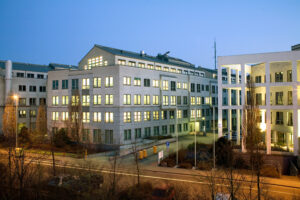The Leibniz Institute for Regional Geography (Leibniz-Institut für Länderkunde, IfL) is the only non-university research institute for geography in Germany. Together with 96 other independent research institutions, the IfL is a member of the Leibniz Association.
Under the heading “Geographies of the Regional” we analyse regional restructuring processes, their economic and social impacts, and regional policy responses in an integrated spatial perspective focussing on Central and Eastern Europe. Furthermore, we are concerned with the theoretical and historical foundations of Regional Geography. Based on the results of our historical-geographical analyses, we elaborate for example new and different narrations of Regional Geographies under today’s conditions of globalisation.
In our research area “Multiple Geographies of Regional and Local Development” we deal with socio-spatial polarisations that create multiple geographies at different scales. The focus is on the question of how actors from politics, the economy and civil society initiate new developments. Contributing to the wider debate on spatially balanced and socially just development, the research area concentrates on alternative perspectives of structurally weak and peripheralised regions in Germany and Eastern Europe.
Another focus lies on “Geographies of Belonging and Difference”. Under this heading, we analyse how and to what end differentiations and belongings are produced in and through references to space, how they are articulated and how they are purposefully employed in various social arenas. We are particularly interested in the relation between political regulation and everyday practices, as well as between media discourses and subjective emotions and experiences in the production of social inclusions and exclusions.
The research group “Mobilities and Migration” at IfL focusses on questions of access to and negotiations of mobility, on infrastructures which enable or preclude mobility, and on biographical approaches to mobility and migration decisions. Current research deals for example with the circulation of knowledge on mobility transformation and its impact on the interaction between centres and peripheries, and with success factors for a social and economic integration of international migrants in rural areas.
Furthermore, we pursue the question how geographic knowledge is adequately conveyed through maps and other spatial visualisations, and how maps do shape our idea of space and of developments in space. In this context, we develop concepts and approaches for geovisual products that are open to diverse and different user and interest groups.
The IfL sees the exchange between academia and the non-academic world as an important task. It prepares research results and geographical information for a wider audience and contributes to geographical education through publications (print and online), lectures, exhibitions etc.
The IfL maintains intensive co-operation with the University of Leipzig, e.g. in the active involvement in the Collaborative Research Centre “Processes of Spatialization under the Global Condition” and the Leibniz ScienceCampus “Eastern Europe – Global Area”.
Learn more about the Leibniz Institute for Regional Geography at https://leibniz-ifl.de

For more information about RSA Corporate memberships, please see here.